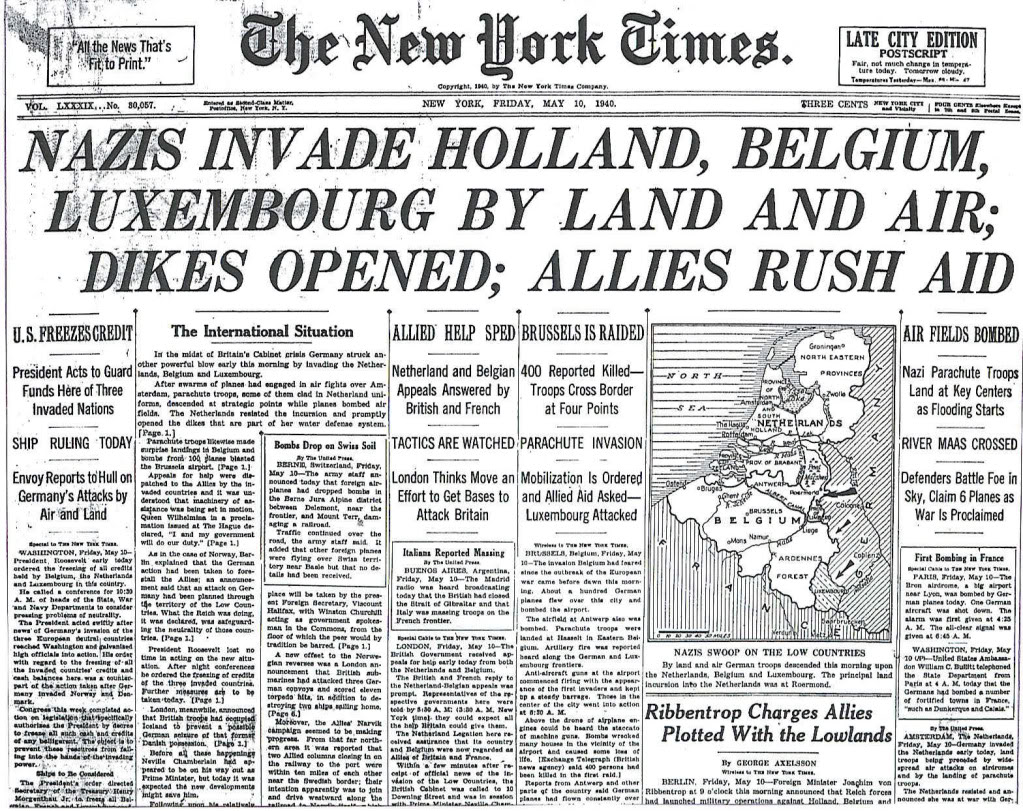My slight ‘fluency’ in French was to save me from the worst excesses of Army life. I was sent to Lille with two other men to man the telephone switchboards which operated between the British and French armies. My most frequent remark was, “Parlez lentement s’il vous plait”, as excited Frenchmen asked to be connected to their British counterparts. Lille was a ‘leave’ area for the British Expeditionary Force. There was a famous street of brothels – the Rue ABC – which did a roaring trade, and the cafes were full of semi-drunken British soldiers. It was the time of the ‘phoney war’, when neither side wanted to make a forward move so as to be labelled the aggressor. Patrols went between the Siegfried and Maginot lines and prisoners were occasionally taken, but they were often released back to their own sides.
My job in Lille was not to last very long. Without explanation I was suddenly taken back to my own unit. The explanation came a few days later. I had been selected to play football for the Division against the French Army, and was required to train for two days. There was one other man from our unit – a dispatch rider called Ernie Hunt, who was to die tragically a few months later in a traffic accident. The game was a real pleasure, and the fact that we won added to our prestige. However, as an untrained soldier, I was soon back to fatigues and guard duties.
By now we were stationed near La Bassee and were able to visit the battlefields of the first World War. We were taken to see Vimy ridge, and marvelled at the underground passages and the closeness of. the opposing front lines to each other.
Suddenly the ‘phoney war’ ended. The Germans invaded the Low Countries and rapidly approached France. We were immediately sent forward to meet them. As we crossed the Franco-Belgian frontier north of Lille the villagers threw flowers and the women rushed out to embrace us as their saviours from the invaders. After only a few days we would be in full retreat before the panzer divisions. We met the Germans on the Albert Canal, and I had my first taste of ‘action’. I, like most others, was terrified. We were armed with rifles and machine guns, and we faced well-trained tank crews and heavy artillery. We soon fell back, and our reception on recrossing the frontier back into France was, to say the least, ‘unfriendly’.

We wandered about in long convoys mixed up with fleeing civilians and French Army horse-drawn columns. We had numerous adventures, including the ‘rescue’ of a dozen cases of whisky which were floating down a river. I managed to wound a horse whilst on night sentry duty at one of our farm camp sites. On receiving no reply to my challenge into the darkness, I fired, and there was a loud thrashing and neighing from the bushes. The horse was fortunately only slightly hurt when we found it the following morning. So far as I know, this was the only casualty I was responsible for during my service with the B.E.F.
We moved from village to village, apparently without plan or motive, when we were suddenly paraded and told that a valuable wireless set had been left behind in the previous village, which may or may not now be occupied by the Germans. Three volunteers were required to drive in, collect the wireless, and dash back. True to what I had been told by older hands, I did not volunteer, and neither did anyone else, so three men were selected at random, of which, of course, I was one. We set off in a small truck, and sure enough the village was occupied by Germans. It was the first time I had come near to the enemy on a personal basis, but strangely, they took absolutely no notice as we drove down the village street. We stopped at the house where the wireless had been left, and the Corporal, who was driving, ordered the other man and myself to go in and recover the instrument. (The wireless was the size of a table top, so was heavy and bulky.) This we did, and within a minute we were outside the village, and twenty minutes later back with our own unit. The Corporal was awarded the Military Medal for the exploit, but the other man and myself were not even thanked. The Corporal became known as “The Medallist” – a term of contempt amongst lower ranks who knew the whole story.